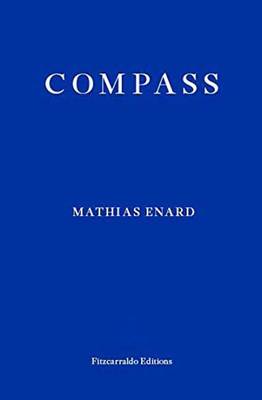Mathias Énard, Compass (2015)
Translated from the French by Charlotte Mandell (2017)
Compass is the latest novel by Mathias Énard, author of Zone (which I reviewed here alongside Paul Kingsnorth’s The Wake). The original French novel, Boussole, won the Prix Goncourt in 2015. Now the English translation is up for the Man Booker International Prize.
Compass is narrated by Franz Ritter, a Viennese musicologist in the grip of an unknown illness. Over the course of a night, he takes us through his memories. On a personal level, many of these concern Sarah, a French scholar he has known for many years, and for whom he harbours unrequited feelings. But Ritter also ranges over his professional interests: cultural encounters between East and West.
The dense, erudite, digressive paragraphs of Compass will be familiar to readers of Zone. But there seem to be more moments of lightness this time, punctuating the turmoil of Ritter’s night. The trawl through his mind highlights how much influence Eastern music and art had on Western arts in the 19th century. Compass also suggests that “the Orient” has become a cultural construct built up by both West and East, independent of historical reality. However, although Ritter may be preoccupied with scholarship at times, his thoughts still return to the personal. Even his relationship with Sarah seems to have reached a new chapter by the end of the night.

Should this book reach the MBIP shortlist?
The Shadow Panel called Zone in a couple of years ago, since we felt strongly that it should have been included on the then Independent Foreign Fiction Prize longlist. Personally, I don’t think Compass quite reaches the heights of Zone, because it’s not formally as tight. Nevertheless, this is a significant work of literature in an excellent translation, and it would certainly merit a place on the shortlist.

23rd March 2017 at 6:15 am
Interesting in a competition that in fact a writer is often up against themselves and their previous work, as well as being up against other writers. I wonder how differently novels would be judged if they were presented anonymously, it couldn’t happen of course, but your reflections make me wonder.
23rd March 2017 at 1:27 pm
I’m not sure anything much he does will match up to Zone – that would be a difficult book to surpass. This does sound good though.
Did you read his Street of Thieves? My impression is that it’s the weakest of the three translated so far, but I could be quite wrong in that.
Re the Prix Goncourt, I think a writer can only win it once so this may well reflect that he should have won it for Zone.
24th March 2017 at 12:09 pm
Thanks for your comments, folks. I should say that I only mentioned Zone because it was a point of comparison that I used for myself to help decide what I thought about Compass. As I get further into the longlist, I’ll be able to use the other books as my comparison.
Claire: in terms of novels being judged anonymously, I think a lot would depend on what the judges had already read. For example, anyone who new Zone would work out the author of Compass pretty quickly.
Max: no, I haven’t read Street of Thieves yet. I get the impression that it’s more conventional than Zone or Compass.